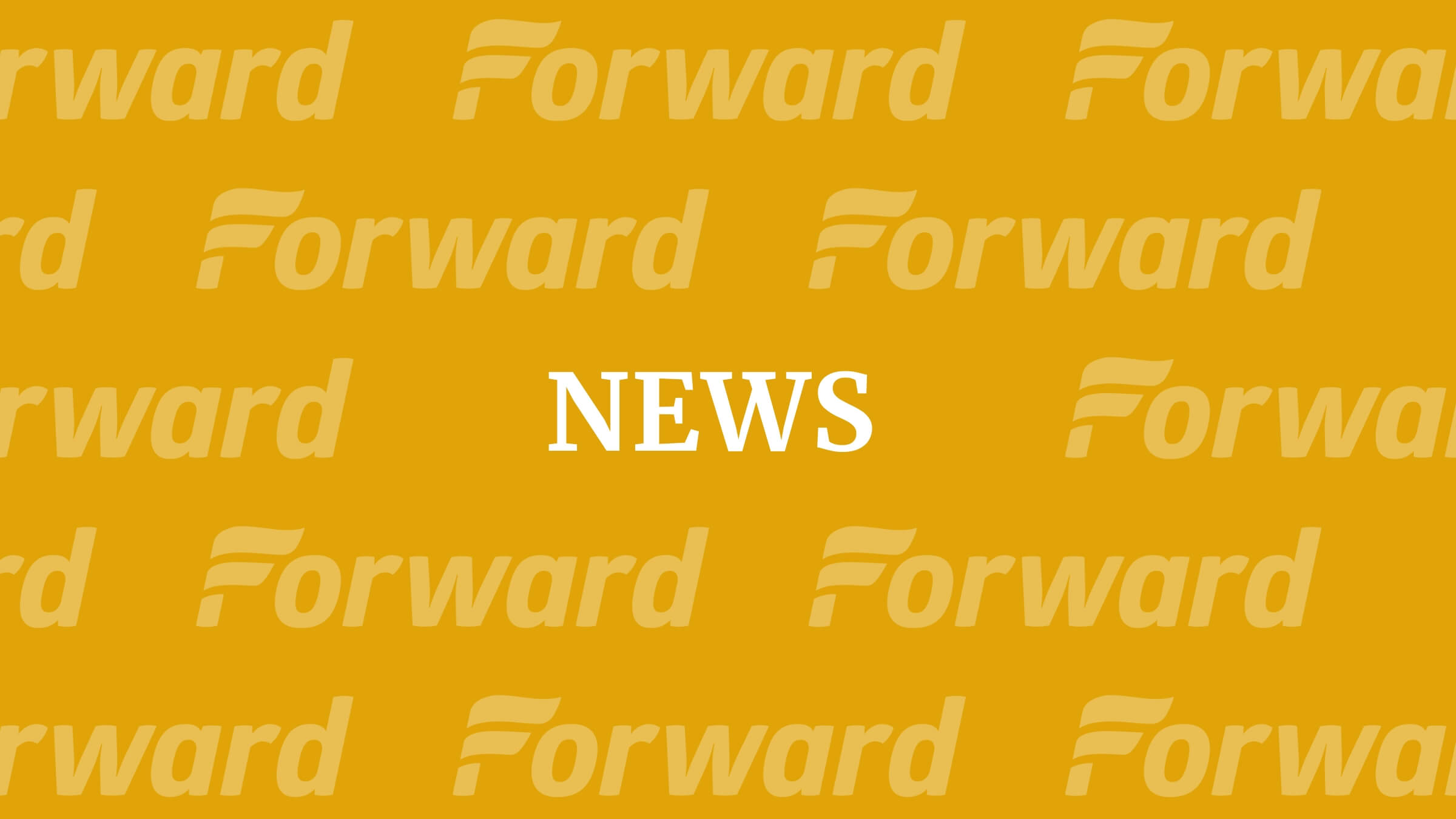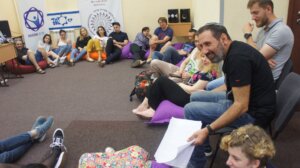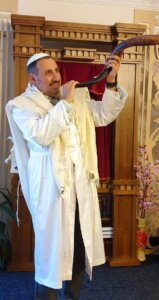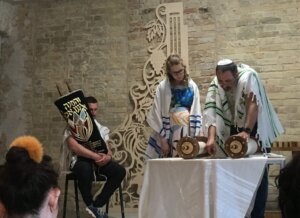Raised without Judaism, Ukraine’s Conservative rabbi now leads 5 Jewish communities through war
‘When I look at people in prayer nowadays, I see how sincere and soulful they are, especially when praying for peace,’ said Rabbi Reuven Stamov

Graphic by Angelie Zaslavsky
Born and raised in the Crimea in the Soviet era, Rabbi Reuven Stamov knew little of Judaism, and hardly practiced it, but still bore the brunt of antisemitism. Seeing little opportunity in Ukraine, he decided to make aliyah, and prepared by taking Hebrew classes.
As he learned the language, he befriended other Jews who embraced Zionism, but also Judaism, and he grew curious about his faith. After making aliyah in 2003, he studied to be a rabbi and was ordained at Jerusalem’s Schechter Institute of Jewish Studies, which is affiliated with the Conservative movement, known as Masorti Judaism outside the U.S. He spent nearly a decade in Israel, knowing his future lay elsewhere.
“I knew I would return to Ukraine and develop Conservative Judaism in my native land,” said Stamov.
The Conservative movement’s footprint in Ukraine had been small. Today Stamov, 48, presides over five Ukrainian Jewish communities — in Kyiv, Odesa, Dnipro, Kharkiv, and Chernivtsi — which include about 300 families.
In February, when Russia invaded Ukraine, Stamov helped dozens of those families to leave the country. And he assured that those who stayed had food, medical care and spiritual support. He and his own family went to Israel, but Stamov returned to Ukraine in time to celebrate Shavuot.
During the holiday, at Masoret, his unassuming synagogue in Kyiv, he talked with Helen Chervitz, the Forward’s correspondent in Ukraine, about his drive to strengthen Jewish life in the country in peace, and now war. He has since returned to Israel, but plans to fly back and remain in Ukraine in the fall, by which time he hopes more of the country’s Conservative Jews have also decided to come home.
Translated by Chervitz, this interview has been edited for length and clarity.
Where were you when the Russians invaded on Feb. 24 and what did you decide to do?
My wife and I were with our three daughters — ages 7, 14, and 16 — in the town of Chernivtsi, in Western Ukraine, preparing for a seminar. Far from the fighting, we were able to quickly organize, and raise money from the global Masorti movement to send people to safety abroad. We urged members of our communities to come to Chernivtsi, and from there we relocated them to Romania, Germany and Israel.
Among the evacuees were women with children. People were crying and traumatized. We organized refugee camps in Chernivtsi, where one of our congregations is located, and in other Western Ukrainian cities — Mukachevo and Lviv. We traveled for four days by bus with a group of 80 families. Some settled in Romania, and others went on to Berlin and Israel.
You oversee five Conservative synagogues in Ukraine. And your wife, Mihal Stamov, runs several educational and cultural programs within the movement. What’s become of your work since the war began?
When the war broke out, it felt as if the world turned upside down. Our priority became getting people out of war zones, away from the shelling. People panicked, and thought Kyiv would be occupied within days.

Since most of the members of our communities went to Western Ukraine or abroad, we switched to Zoom. We engaged mental health professionals who work online, and restarted our classes on Jewish history and traditions online in March. Now we are trying to organize in-person summer camps for children and adults in Romania and Germany, where most of our members remain.
Despite the war, we have managed to host some gatherings in Europe and in Israel. Last year we won a grant from Limmud, and planned Shabbatons and seminars on Jewish culture in Odesa, Kharkiv, and Chernivtsi. Because of the war, we were able to host only one of the Shabbatons, in Odesa.
Tell us about the Jews of Ukraine, and your congregation in particular.
In Ukraine today, Jews aren’t connected to Judaism. Since the collapse of the Soviet Union, a new generation has been born and raised by parents who could not give them a Jewish upbringing. But their heritage needs to be passed on.
I’d say 90% of Jews in Kyiv aren’t affiliated with a synagogue, and many identify as atheist or agnostic. Our members are mostly young, either students or people in their 30s and early 40s. There are about 80 families in Kyiv, mostly middle- or upper-middle class professionals. Our target audience is fairly intellectual.
I’ve noticed people becoming more religious during this war. Are you noticing that too?
I see more people who used to consider themselves atheists. There are no atheists in the trenches. When I look at people in prayer nowadays, I see how sincere and soulful they are, especially when praying for peace. Judaism is an ancient religion, but it can help people cope with the challenges of any time.

You were raised during the Soviet era — what was your Jewish life like in Ukraine?
I was born into an absolutely secular family. We observed virtually no religious traditions. I remember my grandmother bringing matzo into the house once a year and we ate it with Easter eggs. What we knew of Judaism was what we were told by antisemites. And we knew we were Jewish by the way others treated us: We had few or no job opportunities, and if you were lucky enough to get a job you wouldn’t get a promotion. My parents persuaded me to change my last name from Eisenstein to Stamov so it wouldn’t tip people off to my Jewishness. Yet at the university, I did not hide my heritage.
Antisemitism subsided in the Ukraine in the 1990s. I graduated with a degree in engineering, but finding a job was impossible. I realized that what I learned in university was hopelessly outdated. I was also was curious about my faith, and wanted to explore it more deeply. So I decided to leave for Israel.
I prepared by taking Hebrew classes in Simferopol, the second-largest city in Crimea. There I met very interesting people, mostly my age — committed Zionists who were laid back about religion. Sure, they lit candles on Friday nights, but right after this, had a disco party. It all suited me.
Initially, I joined the Reform community, and studied for two years at Machon, which was the movement’s school in Moscow. I then returned to Crimea as a regional religious leader. At that time there were eight Reform communities in Crimea, and all were launched with my help.
Why did you switch to Conservative Judaism?
That’s where I feel I belong. I felt uncomfortable inside the Reform movement. I felt a lack of God. In 2002 I was invited to work at the Conservative movement’s Rama Yahad sleepaway camp near Kyiv, where I met an activist in the movement, Gilda Katz. Conservatives observe the rules about Shabbat and kashrut, but also embrace modernity, and pluralism. Women’s rights are not restricted. One of our female members, Alisa Tzipi Zilbershtein, has been ordained in New York this year, and so our congregation will soon have two rabbis.
How has the Conservative movement in the U.S. and the Masorti movement globally responded to the war?

Masorti Olami — the global council of Masori and Conservative synagogues — and the Schechter Institute collected donations. Thanks to them, we had money to establish refugee camps and bring people to safety — we’re still doing that.
Ukrainian Jewish businessmen donate primarily to Orthodox synagogues. Fundraising on behalf of the Conservative movement in Ukraine is more challenging. We charge congregants a membership fee of $10 a month. Some give more and those who cannot afford it contribute in other ways — by cleaning, doing repairs, or teaching — all of which strengthens their connection to the community. We also want to help our members become more prosperous, so we’re not so dependent on donations from abroad.
Do you have a message for American Jews?
I want to thank them for their ongoing support — and their warnings that we were about to be plunged into war, which many in Ukraine could not imagine would happen. Also, because Russia spreads antisemitic disinformation about Ukraine, it’s very important for the American Jewish community to speak out about its support for the country.















